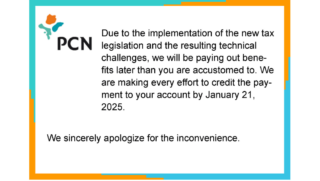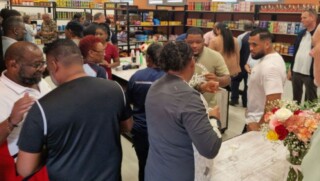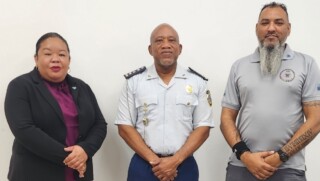Who is who in the Upcoming Island Council Elections Bonaire?

By Harald Linkels
Kralendijk- On March 20th there will be elections for the local parliament in Bonaire, the Island Council. A total of 9 seats are up for grabs. There are in total 8 parties participating in the elections. Time for a little who-is-who? in Bonaire Politics.
The party that so car comes across as the most professional and well-organized is without a doubt the Movementu di Pueblo Boneriano (MPB) of party leader Elvis Tjin-Asjoe. The blue party has the largest number of candidates and has been able to present themselves well during the various political debates. The party also excels in its social media campaign, professional ads and the fact that it has representatives on its list of the most important population groups on the island. The list includes a candidate from European-Dutch origin, from Latino origin and from Haitian origin. Apart from party Leader Tjin Asjoe, someone who will without doubt score well in the upcoming elections is the number 2 on the MPB-list, Nina den Heyer. Den Heyer in her period as Commissioner was seen by many as a ‘go-getter’ and as someone who was able to work well with her counter parts in The Netherlands.
The Partido Democratico Boneriano (PDB or Democrat) has managed to present itself surprisingly well in recent weeks. The party of party leader Clark Abraham has had a turbulent period, with an internal split and problems some problems in the private domain of its party leader. Many did not give a lot for the chances of the red party, given the circumstances. However, party leader Abraham can easily be judged as the strongest “debater” of all leaders. In comparison with all its competitors, Abraham has the best knowledge on important files and knows even the smallest details when it comes to, for example, legislative processes or underlying figures. The PDB party list contains both interesting experienced candidates and some new and young upcoming political talents such as the striking Kia Silberie.
The Forsa Social Progresivo (FSP) so far has also been able to present themselves well, thanks mainly to party leader Robbie Beukenboom. Beukenboom, who left the party ranks of the PDB nearly two years ago, together with colleague Miruga Janga. Beukenboom is a very experienced politician of the somewhat ‘older generation’ and possesses good knowledge on important files. Beukenboom knows how present the ideas of his party reasonably well and shows reasonable consistency when it comes to the most important themes in local politics. The legalization of (medicinal) cannabis seems to be the most important point that makes the orange party ‘progressive’, as its name suggests.
The party that has been disappointing so far is the Union Patriotiko Boneriano (UPB). The party forms part of the current Executive Council and has a very long ’track record’ when it comes to the local island government. So far however, this experience is not very apparent in the debates and the party often does not rise above general statements of what would be good for the island. Party leader James Kroon often appears somewhat less strong verbally compared to competitors from the blue, red and orange party. The second candidate on the party list though, family doctor Esther Bernabela, scores better in that respect than the leader of the green ‘grand old party’, which is -by far- not as dominant as they used to be for decades.
The Era Nobo of party leader Kevin Thode is critical attitude about the role of the Netherlands in local politics and the influence of “The Hague” on the island. The party is quite able to express what they are opposed to, but is not so strong in providing concrete alternatives as to how they island should be managed. Having said that, in the run-up to these elections, the party has been able to present itself reasonably well and will certainly succeed appeal to a group of voters. When it comes to content, the party has a strong contributor in activist Isbertha (Betty) Engelhart, who has also regularly appeared in the media with criticism of the role of The Netherlands in how the BES-islands are managed.
The other (small or one-man) parties like Lista Suzanne Thode, 1 Pueblo and Rafael Santana actually add little weight to the overall political picture and will -most probably- not influence the outcome of elections too much.
Possible outcome
As thing stand now, it seems likely that the MPB will be able to win the most seats, followed by the PDB and to a lesser extent the UPB and the FSP. How much each party will manage to win will determine the composition of the next Executive Council. The MPB hopes to gain absolute majority (5 out of 9 available seats). This would enable them to form a government without any coalition partner.
Should the blue party however win less than 5 seats (not an unlikely scenario given the various contenders), they will have to form a coalition with at least 1 other party, which could be the UPB, the PDB or the FSP. The problem is that over the last 4 years, coalition governments have proven to be quite if not extremely unstable.













